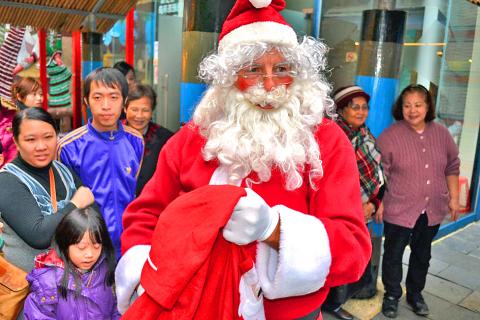Many of you are secretly pining for an iPhone 6 or a new boyfriend for Christmas (I want both). But a quick MRT ride to Xindian (新店), followed by a short bus ride to Wulai (烏來), you’ll realize that another world exists outside of first-world winter woes.
Many of us long-term expats have made Taiwan our “home” and as the holiday season rolls around, it’s time to give back to the country that has done so much for us. For the fourth year in a row, the Atayal Organization has co-organized a Christmas charity drive for the children of the Atayal community in Wulai.
Their efforts will culminate in a Christmas show outside of the Wulai Atayal Museum on Sunday. Santa will be handing out donated school supplies, clothes and candies to the local children. There will also be caroling and reveling.

Photo courtesy of Russ McClay
‘Spiritual home’
Tony Coolidge, the organization’s executive director, moved from the US to Taiwan five and a half years ago after the passing of his Atayal mother. Since then, he has considered Wulai his “spiritual home.”
“Coming to Taiwan to discover [my] roots has been part of my healing and reconnecting with a sense of family,” Coolidge told the Taipei Times. “I am always at peace when I’m amongst the mountains, clouds and butterflies — the Aboriginal people of Wulai are my family, so I feel a calling to do what I can to give back.”
The idea behind “Christmas in Wulai” originated from him and his friend Gary Smoke, who now serves as the organization’s director of international relations.
“Since I was already known in social circles as a Santa Claus every holiday season, Tony and I decided to join forces to give back to the Wulai Aboriginal community together,” said Smoke (spoiler alert: Smoke is Santa).
Smoke adds that “the Wulai children are especially touched when they see that people all over Taiwan and other parts of the world care enough about them to come to their hometown to share their love through their time, efforts and gifts.”
This year the focus has also been on cultural exchange, and, in particular, educating visitors about Aboriginal culture through the picturesque scenery and the museum’s exhibits. Smoke says that this year’s event will be a precursor to a future project the organization is developing to arrange more tours to Wulai for Taiwanese and foreigners to discover its local culture in a non-hyped-up touristy setting.
On the other hand, Coolidge adds, “our event adds a touch of international culture to the lives of local residents — it may help some children realize that there is a bigger world out there beyond Taiwan and inspire them in the future to go beyond the world they know.”

That US assistance was a model for Taiwan’s spectacular development success was early recognized by policymakers and analysts. In a report to the US Congress for the fiscal year 1962, former President John F. Kennedy noted Taiwan’s “rapid economic growth,” was “producing a substantial net gain in living.” Kennedy had a stake in Taiwan’s achievements and the US’ official development assistance (ODA) in general: In September 1961, his entreaty to make the 1960s a “decade of development,” and an accompanying proposal for dedicated legislation to this end, had been formalized by congressional passage of the Foreign Assistance Act. Two

Despite the intense sunshine, we were hardly breaking a sweat as we cruised along the flat, dedicated bike lane, well protected from the heat by a canopy of trees. The electric assist on the bikes likely made a difference, too. Far removed from the bustle and noise of the Taichung traffic, we admired the serene rural scenery, making our way over rivers, alongside rice paddies and through pear orchards. Our route for the day covered two bike paths that connect in Fengyuan District (豐原) and are best done together. The Hou-Feng Bike Path (后豐鐵馬道) runs southward from Houli District (后里) while the

March 31 to April 6 On May 13, 1950, National Taiwan University Hospital otolaryngologist Su You-peng (蘇友鵬) was summoned to the director’s office. He thought someone had complained about him practicing the violin at night, but when he entered the room, he knew something was terribly wrong. He saw several burly men who appeared to be government secret agents, and three other resident doctors: internist Hsu Chiang (許強), dermatologist Hu Pao-chen (胡寶珍) and ophthalmologist Hu Hsin-lin (胡鑫麟). They were handcuffed, herded onto two jeeps and taken to the Secrecy Bureau (保密局) for questioning. Su was still in his doctor’s robes at

Mirror mirror on the wall, what’s the fairest Disney live-action remake of them all? Wait, mirror. Hold on a second. Maybe choosing from the likes of Alice in Wonderland (2010), Mulan (2020) and The Lion King (2019) isn’t such a good idea. Mirror, on second thought, what’s on Netflix? Even the most devoted fans would have to acknowledge that these have not been the most illustrious illustrations of Disney magic. At their best (Pete’s Dragon? Cinderella?) they breathe life into old classics that could use a little updating. At their worst, well, blue Will Smith. Given the rapacious rate of remakes in modern